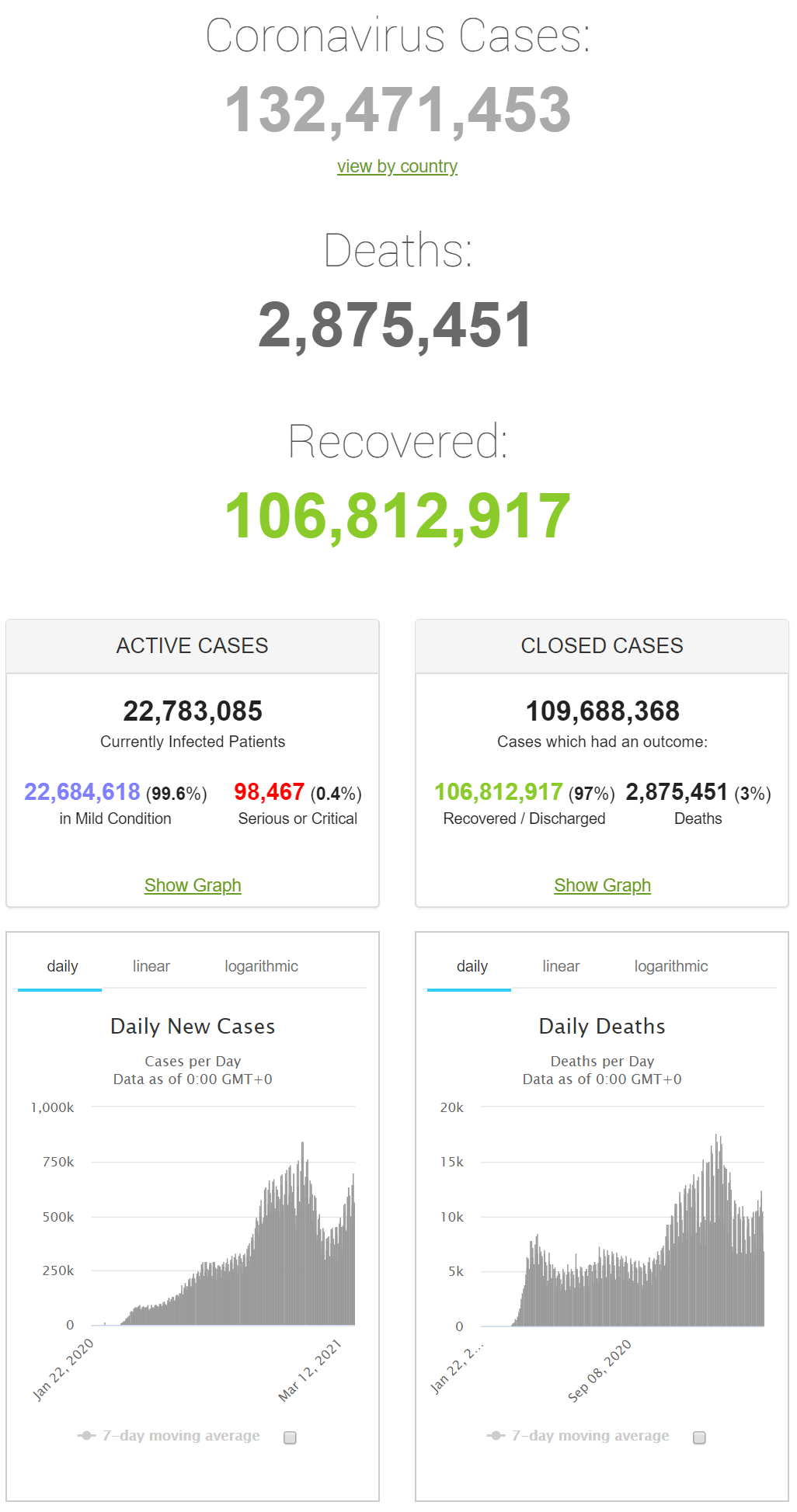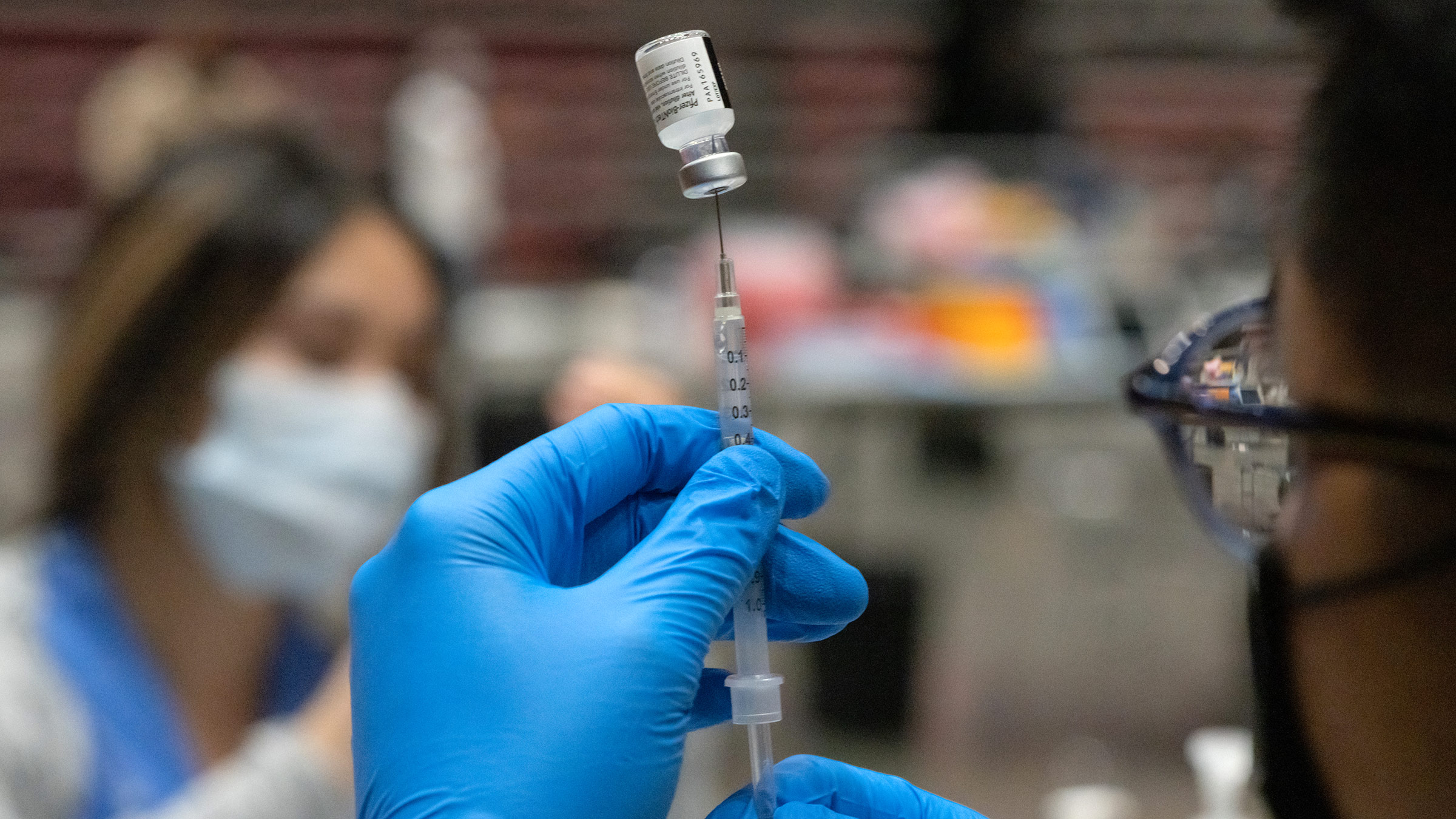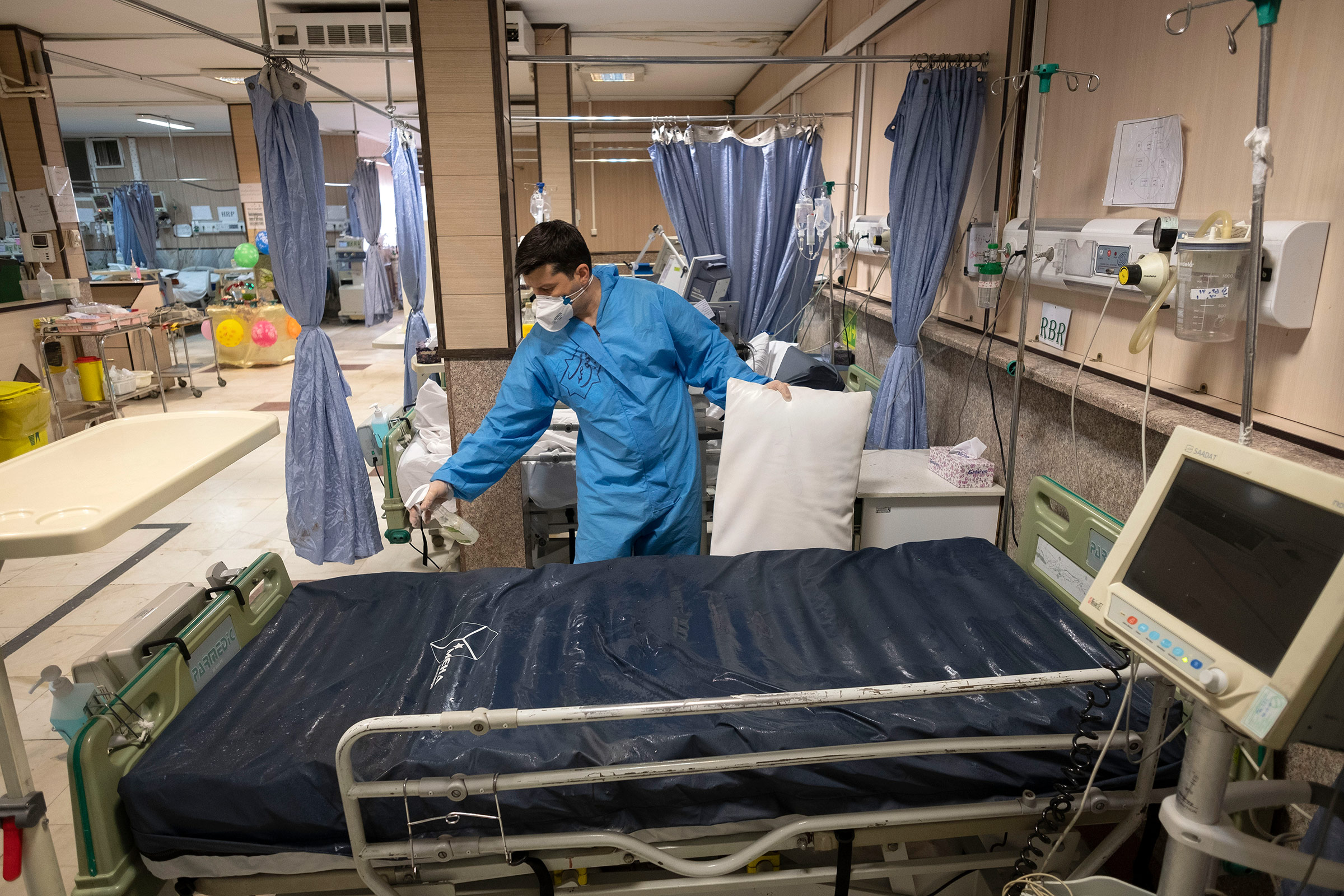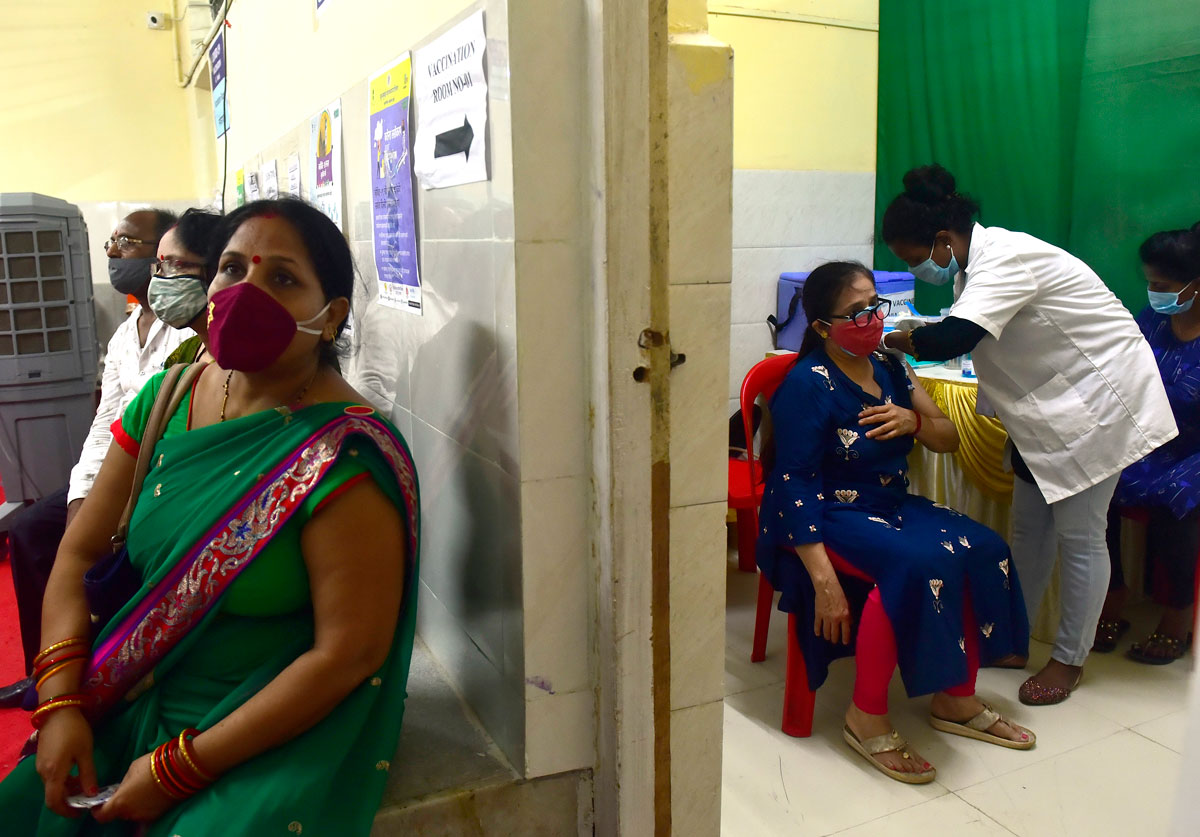
 i_need_contribute
i_need_contribute


|
Country, |
Total |
New |
Total |
|
World |
132,410,526 |
+475,953 |
2,873,406 |
|
31,496,976 |
+56,742 |
569,282 |
|
|
13,023,189 |
+38,233 |
333,153 |
|
|
12,684,477 |
+96,557 |
165,577 |
|
|
4,833,263 |
+10,793 |
96,875 |
|
|
4,589,540 |
+8,646 |
100,717 |
|
|
4,362,150 |
+2,762 |
126,862 |
|
|
3,678,944 |
+10,680 |
111,326 |
|
|
3,529,601 |
+42,551 |
32,456 |
|
|
3,311,325 |
+4,660 |
75,783 |
|
|
2,903,036 |
+7,405 |
77,630 |
|
|
2,456,409 |
+10,190 |
64,293 |
|
|
2,448,463 |
+9,902 |
55,005 |
|
|
2,407,159 |
+13,667 |
56,471 |
|
|
2,250,458 |
+1,263 |
204,147 |
|
|
1,945,964 |
+13,890 |
63,332 |
|
|
1,755,888 |
+10,179 |
34,587 |
|
|
1,590,209 |
+7,842 |
53,138 |
|
|
1,553,840 |
+1,921 |
27,115 |
|
|
1,552,416 |
+452 |
52,995 |
|
|
1,537,967 |
+3,712 |
41,815 |
|
|
1,307,466 |
+5,320 |
16,629 |
|
|
1,032,612 |
+5,827 |
23,677 |
|
|
1,014,374 |
+10,386 |
23,118 |
|
|
977,986 |
+3,611 |
24,190 |
|
|
900,996 |
+3,522 |
23,169 |
|
|
879,991 |
+6,423 |
14,502 |
|
|
834,603 |
+356 |
6,248 |
|
|
823,494 |
+159 |
16,885 |
|
|
803,398 |
+8,355 |
13,435 |
|
|
692,231 |
+4,323 |
14,821 |
|
|
689,853 |
+3,874 |
21,928 |
|
|
644,439 |
+7,075 |
9,318 |
|
|
639,444 |
+6,537 |
7,283 |
|
|
621,375 |
+3,706 |
5,497 |
|
|
560,972 |
+2,217 |
9,482 |
|
|
498,329 |
+132 |
8,857 |
|
|
485,325 |
+2,458 |
9,231 |
|
|
480,502 |
+1,001 |
6,443 |
|
|
472,148 |
+2,012 |
1,512 |
|
|
393,377 |
+695 |
6,704 |
|
|
365,400 |
+158 |
10,094 |
|
|
356,859 |
+3,860 |
13,786 |
|
|
356,556 |
+179 |
6,138 |
|
|
352,029 |
+1,070 |
1,295 |
|
|
336,777 |
+1,096 |
16,987 |
|
|
328,290 |
+986 |
2,294 |
|
|
284,061 |
+228 |
3,822 |
|
|
280,164 |
+138 |
6,083 |
|
|
278,210 |
+266 |
3,036 |
|
|
277,277 |
+1,863 |
8,453 |
|
|
274,934 |
+467 |
12,324 |
|
|
271,834 |
+1,099 |
3,711 |
|
|
261,177 |
+1,133 |
8,993 |
|
|
255,028 |
+1,921 |
3,110 |
|
|
254,435 |
+140 |
3,351 |
|
|
253,922 |
+2,634 |
2,716 |
|
|
238,549 |
+1,357 |
1,365 |
|
|
238,466 |
+318 |
4,718 |
|
|
235,790 |
+703 |
5,178 |
|
|
233,797 |
+479 |
2,430 |
|
|
222,663 |
+1,456 |
4,463 |
|
|
220,425 |
+283 |
4,082 |
|
|
220,212 |
+600 |
3,615 |
|
|
217,327 |
+2,138 |
3,000 |
|
|
205,732 |
+767 |
12,210 |
|
|
197,113 |
+479 |
3,614 |
|
|
195,680 |
+209 |
6,894 |
|
|
190,631 |
+153 |
4,644 |
|
|
184,334 |
+910 |
306 |
|
|
167,548 |
+1,425 |
1,678 |
|
|
164,274 |
+1,117 |
1,722 |
|
|
163,442 |
+1,148 |
2,757 |
|
|
163,330 |
+135 |
2,058 |
|
|
149,791 |
+974 |
541 |
|
|
142,511 |
+14 |
3,206 |
|
|
139,448 |
+460 |
2,244 |
|
|
135,167 |
+300 |
3,977 |
|
|
126,795 |
+264 |
2,274 |
|
|
119,958 |
+2,201 |
1,146 |
|
|
117,739 |
+117 |
3,108 |
|
|
109,781 |
+382 |
950 |
|
|
105,752 |
+473 |
1,748 |
|
|
104,224 |
+119 |
1,934 |
|
|
99,249 |
+797 |
676 |
|
|
93,595 |
+159 |
581 |
|
|
92,740 |
+221 |
1,317 |
|
|
90,900 |
+118 |
752 |
|
|
90,305 |
+32 |
4,636 |
|
|
89,153 |
+139 |
1,507 |
|
|
89,009 |
+79 |
1,222 |
|
|
83,802 |
+179 |
631 |
|
|
80,610 |
+1,066 |
436 |
|
|
79,737 |
+341 |
846 |
|
|
68,227 |
+108 |
782 |
|
|
65,491 |
+154 |
2,030 |
|
|
62,414 |
+54 |
760 |
|
|
60,495 |
+17 |
30 |
|
|
29,321 |
+194 |
95 |
|
|
9,681 |
+43 |
90 |
|
|
9,174 |
+11 |
177 |
|
|
2,637 |
+6 |
35 |
Retrieved from: https://www.worldometers.info/coronavirus/
From CNN’s Deidre McPhillips

A health care worker prepares a dose of the Pfizer-BioNTech Covid-19 vaccine inside the Viejas Arena in San Diego, California, on Thursday, April 1. Bing Guan/Bloomberg/Getty Images
The United States is currently administering Covid-19 vaccine doses at a pace that’s nearly five times faster than the global average, and has fully vaccinated a larger share of its population than most countries that have been vaccinating for a similar amount of time, a CNN analysis suggests.
Over the past week, the US administered an average of more than three million doses per day, according to data published by the US Centers for Disease Control and Prevention. That’s more than 900 shots per 100,000 people each day.
Globally, an average of 16 million shots have been administered daily over the past week, according to data published by Our World in Data. That’s about 200 shots per 100,000 people each day.
About 20 countries have been vaccinating their populations against Covid-19 for 100 days or more, including the US.
Since the first shot was administered in the US in mid-December, more than 18% of the population has been fully vaccinated. Vaccinations started about a week earlier in the UK, but only about 8% of the country’s population is fully vaccinated, data from Our World in Data shows. In Canada, which started vaccinations on the same date as the US, only about 2% of the population is fully inoculated.
Despite its successful vaccination campaign, other nations are outpacing the US in terms of vaccination coverage. Israel has fully vaccinated more than half of its population, and Chile has fully vaccinated about 20% of its population. Both countries started vaccinating about a week after the US.
From CNN’s Ramin Mostaghim

A health assistant disinfects a bed in Firoozabadi hospital's Covid-19 ward in Tehran, Iran, on March 20. Morteza Nikoubazl/NurPhoto/Getty Images
Iran has entered its fourth wave of the Covid-19 pandemic and has reached a four-month high in terms of number of daily cases, health ministry spokesperson Sima Sadat Lari said in a news conference on Monday.
“The Covid-19 pandemic in the country is very widespread and is a matter of deep concern, and the fourth wave is rapidly progressing from mid-western parts of the country to mid-eastern cities," Lari said.
The ministry reported at least 13,890 new Covid-19 cases on Monday, increasing the country's total cases since the start of the pandemic to 1,945,964. The country also reported 172 new Covid-19 related deaths, bringing the country's death toll to 63,332 on Monday, as at least 4,095 patients remain hospitalized in intensive care units, Lari said.
The health ministry also announced 88 cities have been categorized as "Red Zones" in Iran, where for two weeks on average more than three people per one hundred thousand are hospitalized.
Iran’s health ministry has been anticipating a spike in cases and death toll, as people begin to return from holiday travel and celebratory gatherings on the occasion of the two-week long Persian New Year holiday, or Nowruz, which began on March 21.
Iran has the most severe Covid-19 outbreak in the Middle East, with the highest number of cases and deaths in the region.
The country continues to keep restrictions in place to avoid a larger outbreak of cases.
From Gawon Bae and Yoonjung Seo in Seoul
People wearing face masks pass by a banner displaying precautions against the coronavirus on a street in Seoul, South Korea, on Monday, April 5. Ahn Young-joon/AP
South Korea on Monday reported 473 new Covid-19 cases in the previous 24 hours, bringing the national total to 105,752, according to a statement from the Korea Disease Control and Prevention Agency (KDCA).
Seoul's metropolitan area accounted for 276 of the total cases. Among the daily figure, 449 were locally transmitted.
The death toll rose by four to 1,748 overall, KDCA said.
On Saturday, South Korea recorded 543 new daily cases -- its fifth day in a row of more than 500.
The rise prompted a warning from South Korea’s Health Minister Kwon Deok-cheol, who said the country could be at the crossroads of a fourth coronavirus wave.
“For the past week, the number of daily new cases has been around 500, clearly showing an increasing trend of infection,” Kwon said in a briefing Sunday.
From CNN's Esha Mitra in New Delhi

A BMC medical staff member administers a dose of the Covid-19 vaccine at the Urban Health Training Centre on April 3 in Mumbai, India. Anshuman Poyrekar/Hindustan Times/Getty Images
India's Maharashtra state and the union territory of Delhi have asked the central government to lower the age limit of those eligible to take the Covid-19 vaccine amid a rise in new cases.
"If the central government allows us to vaccinate people on a mass level then we can create thousands of facilities in schools, community centers and start a war of a vaccination drive," Arvind Kejriwal, Chief Minister of Delhi, said Monday.
Since April 1, the Indian government has provided Covid-19 vaccinations to anyone age 45 and over.
In Maharashtra, where weekend lockdowns and night curfews have been put in place until the end of April to curb the spread of the virus, Chief Minister Uddhav Thackeray reiterated the request to lower the age threshold.
"If a larger number of our young and working population is vaccinated, the intensity of the cases would be much lower than the treatment that they need today," Thackeray said in his letter to Prime Minister Narendra Modi on Monday, asking for the eligibility to be lowered to all above the age of 25.
Maharashtra state accounts for more than half of the new Covid-19 cases in the country.
India is facing a second wave of coronavirus, with more than 100,000 infections reported on Monday, its highest single-day rise since the beginning of the pandemic.
On Tuesday, India reported 96,982 cases, taking the total to 12,686,049, including 165,547 deaths, according to the Indian Ministry of Health.
Retrieved from: https://edition.cnn.com/world/live-news/coronavirus-pandemic-vaccine-updates-04-06-21/index.html
By Emily Anthes

A child being tested for the coronavirus in New Delhi last month.Credit...Money Sharma/Agence France-Presse — Getty Images
A widely used rapid antigen test detects about half of children who are infected with the coronavirus but more than 90 percent of those with the highest viral loads, according to a new study.
“When kids are likely to be infectious, the test is pretty accurate,” said Neeraj Sood, director of the Covid Initiative at the University of Southern California’s Schaeffer Center for Health Policy and Economics and one of the study’s authors. The study, which included more than 200 children infected with the virus, was published Monday in the scientific journal PLoS One.
Rapid antigen tests are typically cheaper and faster than P.C.R. tests, which can detect the virus at very low levels, but they are less sensitive and more likely to produce false negatives. They have been evaluated primarily in adults, and one previous study, conducted at a community testing site in Massachusetts, found that they were less sensitive in children.
Dr. Sood and his colleagues worked with the Los Angeles County Department of Public Health and the Los Angeles mayor’s office to evaluate the performance of BinaxNOW, a rapid antigen test manufactured by the U.S. company Abbott Laboratories that has emergency use approval from the Food and Drug Administration.
In late November and early December, more than 700 children who received P.C.R. tests at a coronavirus testing site in Los Angeles also took antigen tests. In total, 226 children between the ages of 5 and 17 tested positive for the virus on the P.C.R. tests. Of those, 56.2 percent of them also tested positive on the rapid antigen test. That suggests that one-off antigen testing of children is likely to miss roughly half of those who are infected with the virus.
“You’re missing roughly one out of every two positives,” Dr. Sood said. “But not all positives are significant from a public health point of view.”
People are most likely to be infectious when their virus levels are high. The antigen tests caught 93.8 percent of those children with the highest levels of virus in their bodies, the researchers found. The antigen tests were also slightly better at detecting the virus in children who had coronavirus symptoms than in those who were asymptomatic.
“This is another piece of information telling us that these rapid cheap tests are good, not great,” said Michelle Mello, a professor of health research and policy at Stanford University’s School of Medicine. “You need to test often to make up for the fact that they’re not great.”
A test might miss a student who has been infected recently and whose viral load is still low. But a follow-up test, conducted after the virus has had a chance to replicate, might catch that child.
Researchers should continue to evaluate how well these tests, and the screening programs that use them, perform when they are rolled out in real school environments, Dr. Sood said.

The North Koreans at the closing ceremony for the 2018 Winter Games in Pyeongchang, South Korea.Credit...Edgar Su/Reuters
North Korea said on Tuesday that it had decided not to participate in the Tokyo Olympic Games this summer because of the coronavirus pandemic.
The North’s national Olympic Committee decided at a March 25 meeting that its delegation would skip the Olympics “in order to protect our athletes from the global health crisis caused by the malicious virus infection,” according to Sports in the Democratic People’s Republic of Korea, a government-run website.
It is the first Summer Olympics that the North has missed since 1988, when they were held in Seoul, the capital of rival South Korea.
North Korea, which has a decrepit public health system, has taken stringent measures against the virus since early last year, including shutting its borders. The country officially maintains that it has no virus cases, but outside health experts are skeptical.
North Korea’s decision deprives South Korea and other nations of a rare opportunity to establish official contact with the isolated country. Officials in the South had hoped that the Olympics — to be held from July 23 to Aug. 8 — might provide a venue for senior delegates from both Koreas to discuss issues beyond sports.
The 2018 Winter Olympics, held in the South Korean city of Pyeongchang, offered similar hope for easing tensions on the Korean Peninsula. Kim Yo-jong, the only sister of North Korea’s leader, Kim Jong-un, grabbed global attention when she became the first member of the Kim family to cross the border into South Korea to attend the opening ceremony.
Mr. Kim used the North’s participation in the Pyeongchang Olympics as a signal to start diplomacy after a series of nuclear and long-range missile tests. Inter-Korean dialogue soon followed, leading to three summit meetings between Mr. Kim and President Moon Jae-in of South Korea. Mr. Kim also met three times with President Donald J. Trump.
But since the collapse of Mr. Kim’s diplomacy with Mr. Trump in 2019, North Korea has shunned official contact with South Korea or the United States. The pandemic has deepened the North’s diplomatic isolation and economic difficulties amid concerns over its nuclear ambitions. North Korea launched two ballistic missiles on March 25 in its first such test in a year, in a challenge to President Biden.
Since North Korea’s first Olympic appearance in 1972, it has participated in every Summer Games except for the Los Angeles event in 1984, when it joined a Soviet-led boycott, and in 1988, when South Korea played host. North Korean athletes have won 16 gold medals, mostly in weight lifting, wrestling, gymnastics, boxing and judo, consistently citing the ruling Kim family as inspiration.
The Tokyo Games were originally scheduled for 2020 but were delayed by a year because of the pandemic. The organizing committee has been scrambling to develop safety protocols to protect both participants and local residents. But as a series of health, economic and political challenges have arisen, large majorities in Japan now say in polls that the Games should not be held this summer.
Even though organizers have barred international spectators, epidemiologists warn the Olympics could still become a superspreader event. Thousands of athletes and other participants will descend on Tokyo from more than 200 countries while much of the Japanese public remains unvaccinated.
Retrieved from: https://www.nytimes.com/2021/04/05/world/asia/covid-north-korea-olympics.html
Australia risks never achieving herd immunity to Covid-19 unless it ramps up its strategy for engaging with vaccine-hesitant populations, a former health department chief and an epidemiologist have warned.
While health officials remain confident in the effectiveness of the AstraZeneca vaccine, they have told Guardian Australia they are concerned that recent reports about blood clotting will not curb vaccine hesitancy rates.
Health authorities on Monday acknowledged it is “likely” that blood clots developed by a 44-year-old Victorian man last week were linked to the AstraZeneca vaccine.
Deputy chief health officer Michael Kidd noted that his “colleagues overseas appear to be seeing one to two cases” of recipients who develop the condition per one million recipients.
“By contrast we know that the risk of death from Covid-19 remains at one to two deaths per 100 people infected,” Kidd said.
“While at this time we don’t have definitive evidence of causality, the clinical features of the case reported on Friday are consistent with what we have seen in international reports of similar cases. It is likely the case reported on Friday is related to the vaccine,” he said.
Health experts are now concerned Australia’s vaccine-hesitancy rates – which were as high as 36% in mid-March (13% said they will not get any Covid-19 vaccine, 23% said they were unsure) – will remain high without early and intense targeting of hesitant groups.
Stephen Duckett, health program director at the Grattan Institute and former secretary of what is now the Department of Health, has said Australia’s efforts to engage and persuade vaccine-hesitant residents needed to be greater than foreign countries because of our reliance on the AstraZeneca vaccine, and the relative risk profile of a country with no ongoing community transmission.
“The benefit for someone in Australia to get their vaccine is very different to someone in the UK, where the virus is circulating.
“… We’ve put all our eggs in the AstraZeneca basket, apart from a bit of Pfizer,” Duckett said, adding that some Australians are likely wanting to wait and see if the vaccine is linked to any long-term side effects.
Herd immunity could require 65%-90% of the population to be vaccinated, Duckett said, while noting that neither the AstraZeneca nor the Pfizer vaccine have been approved for use in children.
“We just won’t reach herd immunity if those vaccine hesitancy numbers [of 36%] are correct, and there is no reason to believe they are incorrect or have decreased.”
The international border – something reliant on herd immunity – is unlikely to be reopened unless most of the hesitant population is convinced to get vaccinated, Duckett said.
As demand for the vaccine is currently higher than what the government can supply, Duckett said the issue of vaccine hesitancy has not been reflected in vaccination data, but that hesitancy could notably affect the speed of the rollout by July.
“We have a bit of time to plan for this, but this requires a strategy that we haven’t seen so far.
“It requires a different approach to the prime minister and health minister having a televised shot. It needs a campaign to be in place before July, when it will be hard to keep rates ups. I haven’t seen any evidence of this approach.
“The government’s rhetoric has been that everybody who wants a vaccine can get one. This is not good enough and this will not get us to the threshold we need to be able to reopen the international border safely,” he said.
A Department of Health spokeswoman told the Guardian “we want to vaccinate all Australians who wish to be vaccinated”, but would not provide a number for herd immunity.
Hassan Vally, an associate professor in public health and an epidemiologist with La Trobe University in Melbourne, told the Guardian that “vaccine hesitancy is being underestimated” because “surveys are not the same as actually going and getting a vaccination”.
Vally agreed we will get a “better gauge” of vaccine hesitancy once later stages of the rollout ramp up, but said “people are feeling really uncertain”.
“Australians are really responding to news stories about blood clots.”
Vally differentiated between anti-vaxxers – who he believes are about 1.5% of the hesitant population and have firm, unchangeable views about the vaccine – and the larger cohort of vaccine-hesitant Australians.
“It’s the less vulnerable who will question it more, as they perceive their risk of the vaccine as not worth the reward, which is avoiding a bad outcome from catching Covid. They’re going to be more sceptical, but they’re not philosophically opposed to the vaccine.
“They’re quite understandably uncertain and confused given all the information, and they just want what’s best for their family [and] to make the safe decision,” Vally said.
“We have to work really hard, but I think they’re reachable, they’re very responsive to good, reassuring information if they’re engaged correctly. It’s completely appropriate to want to ask questions.
“It’s a problem we’ve underestimated and one we can’t ignore now,” he said.
Retrieved from: https://www.theguardian.com/australia-news/2021/apr/06/australia-warned-it-wont-achieve-herd-immunity-unless-it-deals-with-vaccine-hesitancy